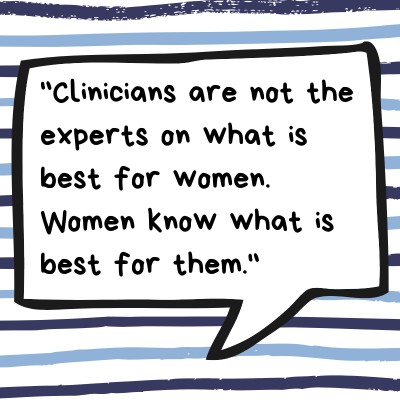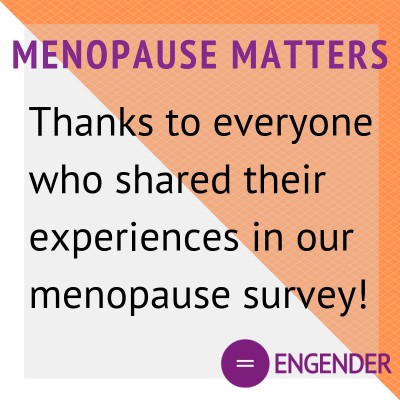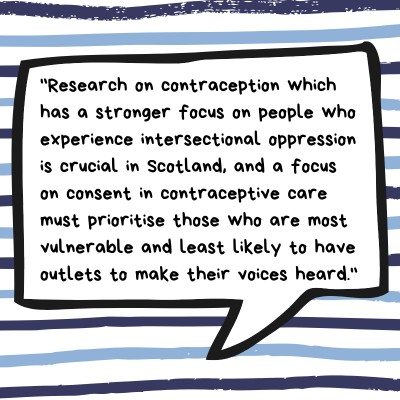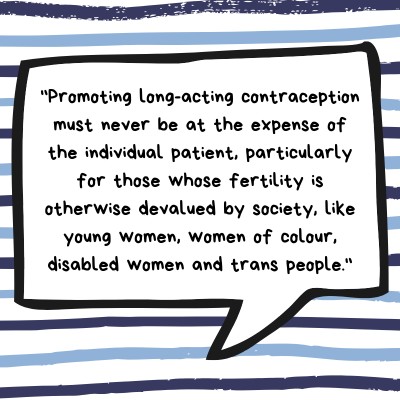Engender blog
Guest Post: Why we must support women to make their own contraceptive choices

Alison Scott is a sexual health consultant with a focus on socially excluded women and chair of the Faculty of Sexual and Reproductive Healthcare (Scotland). Here, she continues our blog series looking at Long Acting Reversible Contraception (LARC) and why choice must be at the heart of women’s reproductive healthcare.
Having trained in obstetrics and gynaecology, I made the decision to move into sexual health around 18 years ago. My boss in sexual health at the time (a formidable force of nature who thought nothing of asking me if my fourth pregnancy had been planned!) was also a woman who had no tolerance of fools but advocated for those who she felt had no voice. At one of our first clinics, we were discussing contraceptive options. She gave me a phrase which I have stolen and used repeatedly when teaching others. “If she doesn’t choose it, she won’t use it”.
Menopause Matters: Ending the stigma

Last week, we said goodbye to our intern Elena Rodriguez, who has been working with Engender to conduct research looking at women’s experiences of the menopause in Scotland as part of her studies at the University of Edinburgh. Elena has been collating the 371 responses we received to our Menopause Matters survey in June, and here she writes to thank all those who took part in survey and explains what the results have revealed so far.
Dear Participants,
Thank you so much for engaging with the survey and sharing it so widely. Today we have 371 different experiences from all over Scotland, and your stories, views and suggestions of what should be done to ending the stigma around the menopause are precious.
We know it is a tough topic to be open about, and that many of you have had painful experiences with health professionals, managers and even family and friends. As many of you told us, it can be a confusing, tiring, frustrating and embarrassing process. We all need to understand it, not just women. We all need to learn about it at a younger age. We all need to be capable of discussing it without minimising it or taking it as a joke. We all need to involve and recognise the people that are struggling with it because many of them are doing so or have done so in silence.
Guest Post: Exploring contraception as a feminist issue

As discussions around schemes which offer women support on the condition they utilise long-acting reversible contraceptives (LARC) continue, we've hosted a series of blogs by Elspeth Wilson discussing her research into how LARC has historically been - and continues to be - used to control the fertility of marginalised people. Read Elspeth's previous blogs here.
In her final blog, Elspeth explores adequate and accessible contraceptive care as a feminist issue.
The Pause programme highlights that accessible contraception is only one part of the fight for adequate contraceptive care. Conversations on contraception frequently focus on access and whether and how people can get the kind of contraception they want to use. Obviously, this an important concern but it is only one side of the conversation. I hope that in my discussion of consent and information in the other blogs in this series I have been able to show that the question of who gets offered what contraception and why must also be central to feminist discussions of contraceptive care. If we are to approach contraception as an intersectional feminist issue the question of whose fertility is (de)valued and whose is seen as something to be controlled is imperative.
Guest Post: Contraception information and consent - two sides of the same coin?
As discussions around schemes which offer women support on the condition they utilise long-acting reversible contraceptives (LARC) continue, we'll be hosting a series of blogs by Elspeth Wilson discussing her research into how LARC has historically been - and continues to be - used to control the fertility of marginalised people. Read Elspeth's previous blog here.
In her second blog, Elspeth discusses ideas around informed consent.
-400.png)
"… they did not mention any of the side-effects nor provide any kind of informational material about what the injection does." [quote from research participant]
Guest Post: Why contraception needs a Me Too moment

As discussions around schemes which offer women support on the condition they utilise long-acting reversible contraceptives (LARC) continue, we'll be hosting a series of blogs by Elspeth Wilson discussing her research into how LARC has historically been - and continues to be - used to control the fertility of marginalised people.
In this first blog, Elspeth discusses ideas around contraception and consent.
I am being told for the third time in a row that there is no possibility that the coil I have fitted could be causing any of the repeated vaginal discomfort and infections that I have been experiencing for months. I explain, again, that I previously had a coil before and that this was the only other time in my life where I had consistent infections but that, because it was my first time using a coil, I had been more easily placated when told there was no possible link. Now, faced with the same difficulties (which ironically made the point of the contraception moot in the first place due to the severe irritation) my literal lived experience of my body caused me to suspect that the coil was the cause of my woes.
Downloads
 Engender Briefing: Pension Credit Entitlement Changes
From 15 May 2019, new changes will be introduced which will require couples where one partner has reached state pension age and one has not (‘mixed age couples’) to claim universal credit (UC) instead of Pension Credit.
Engender Briefing: Pension Credit Entitlement Changes
From 15 May 2019, new changes will be introduced which will require couples where one partner has reached state pension age and one has not (‘mixed age couples’) to claim universal credit (UC) instead of Pension Credit.
 Engender Parliamentary Briefing: Condemnation of Misogyny, Racism, Harassment and Sexism
Engender welcomes this Scottish Parliament Debate on Condemnation of Misogyny, Racism, Harassment and Sexism and the opportunity to raise awareness of the ways in which women in Scotland’s inequality contributes to gender-based violence.
Engender Parliamentary Briefing: Condemnation of Misogyny, Racism, Harassment and Sexism
Engender welcomes this Scottish Parliament Debate on Condemnation of Misogyny, Racism, Harassment and Sexism and the opportunity to raise awareness of the ways in which women in Scotland’s inequality contributes to gender-based violence.
 Gender Matters in Social Security: Individual Payments of Universal Credit
A paper calling on the Scottish Government to automatically split payments of Universal Credit between couples, once this power is devolved to the Scottish Parliament.
Gender Matters in Social Security: Individual Payments of Universal Credit
A paper calling on the Scottish Government to automatically split payments of Universal Credit between couples, once this power is devolved to the Scottish Parliament.
 Gender Matters Manifesto: Twenty for 2016
This manifesto sets out measures that, with political will, can be taken over the next parliamentary term in pursuit of these goals.
Gender Matters Manifesto: Twenty for 2016
This manifesto sets out measures that, with political will, can be taken over the next parliamentary term in pursuit of these goals.
 Scottish NGO Briefing for UN Special Rapporteur on Violence Against Women
Joint briefing paper for the UN Rapporteur on Violence Against Women.
Scottish NGO Briefing for UN Special Rapporteur on Violence Against Women
Joint briefing paper for the UN Rapporteur on Violence Against Women.

Newsletter
Sign up to receive our newsletter here:
Sign up to our mailing list
Receive key feminist updates direct to your inbox: